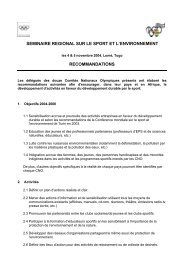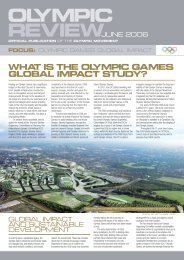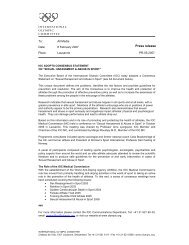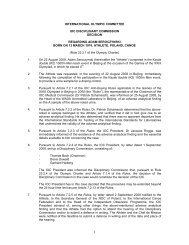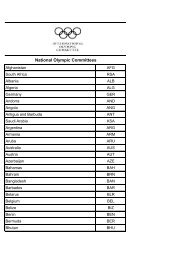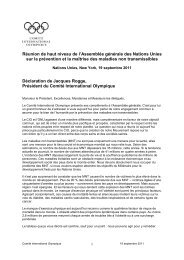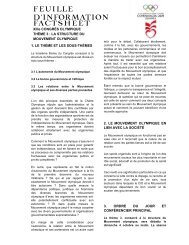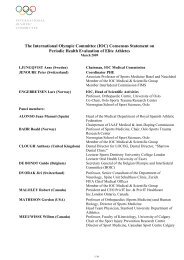7th World Conference on Sport and the Environment - International ...
7th World Conference on Sport and the Environment - International ...
7th World Conference on Sport and the Environment - International ...
Create successful ePaper yourself
Turn your PDF publications into a flip-book with our unique Google optimized e-Paper software.
Report<br />
8. Coastal <strong>and</strong> marine envir<strong>on</strong>ments<br />
Healthy marine <strong>and</strong> coastal envir<strong>on</strong>ments are fundamental to <strong>the</strong> l<strong>on</strong>g-term sustainability of isl<strong>and</strong><br />
societies, as well as providing a basis for subsistence livelihoods <strong>the</strong>y underpin commercial fisheries <strong>and</strong><br />
tourism development – already mainstays of many isl<strong>and</strong> ec<strong>on</strong>omies. The ADB (2004) notes that <strong>the</strong> main<br />
threats to coastal resources come from:<br />
• discharges of nutrients derived from sewage, soil erosi<strong>on</strong>, <strong>and</strong> agricultural fertilizers;<br />
• improper solid waste disposal;<br />
• accelerated sediment discharge, for example from building c<strong>on</strong>structi<strong>on</strong> sites or road building;<br />
• physical alterati<strong>on</strong>s through destructi<strong>on</strong> of fringing reefs, beaches, wetl<strong>and</strong>s, <strong>and</strong> mangroves<br />
for coastal development <strong>and</strong> from s<strong>and</strong> extracti<strong>on</strong>;<br />
• logging; <strong>and</strong><br />
• over-exploitati<strong>on</strong> of fisheries.<br />
While some types of development are clearly focused <strong>on</strong> coastal <strong>and</strong> marine features, <strong>on</strong> most isl<strong>and</strong>s<br />
of <strong>the</strong> Pacific, all developments are likely to cause impacts due to <strong>the</strong> small size of <strong>the</strong> isl<strong>and</strong>s, <strong>and</strong><br />
so comprehensive, integrated isl<strong>and</strong> development planning is essential. Even so, erosi<strong>on</strong> from poorly<br />
managed logging, for example far inl<strong>and</strong> <strong>on</strong> large isl<strong>and</strong>s, can silt rivers that deposit sediment <strong>on</strong> coral<br />
reefs many kilometres distant.<br />
Technology, in particular remote sensing <strong>and</strong> sophisticated computer modelling, is much more available<br />
<strong>and</strong> accessible today than it has been in <strong>the</strong> past for isl<strong>and</strong> countries <strong>and</strong> territories to undertake effective<br />
envir<strong>on</strong>mental planning <strong>and</strong> assessment. The c<strong>on</strong>straints lie in <strong>the</strong> capability <strong>and</strong>/or capacity of nati<strong>on</strong>al<br />
agencies to use this technology effectively, <strong>and</strong> also for planners <strong>and</strong> resource managers to c<strong>on</strong>vince<br />
decisi<strong>on</strong>-makers to make <strong>the</strong> necessary investments. Having undertaken basic analyses, <strong>the</strong> critical next<br />
step is to use <strong>the</strong> informati<strong>on</strong> to make wise resource use decisi<strong>on</strong>s based <strong>on</strong> <strong>the</strong> principles of sustainable<br />
development, <strong>and</strong> to make informati<strong>on</strong> available in a form that can inform <strong>and</strong> engage communities<br />
directly affected by development.<br />
Addressing Envir<strong>on</strong>mental <strong>and</strong> Sustainable Development Issues in <strong>the</strong> Regi<strong>on</strong><br />
For <strong>the</strong> past 24 years SPREP has been assisting member countries to implement sound envir<strong>on</strong>mental<br />
policies, deal with growing issues such as waste management, polluti<strong>on</strong> <strong>and</strong> climate change, <strong>and</strong> to<br />
build <strong>the</strong>ir nati<strong>on</strong>al capacity to deal with envir<strong>on</strong>mental c<strong>on</strong>cerns. At <strong>the</strong> same time, o<strong>the</strong>r regi<strong>on</strong>al<br />
organisati<strong>on</strong>s that now form part of <strong>the</strong> Council of Regi<strong>on</strong>al Organisati<strong>on</strong>s of <strong>the</strong> Pacific (CROP) also<br />
deal with elements critical to <strong>the</strong> sustainable development <strong>and</strong> envir<strong>on</strong>mental management of Pacific<br />
isl<strong>and</strong> countries <strong>and</strong> territories (PICTs). For example, <strong>the</strong> Secretariat of <strong>the</strong> Pacific Community (SPC)<br />
for fisheries, forestry <strong>and</strong> agriculture, <strong>the</strong> South Pacific Applied Geoscience Commissi<strong>on</strong> (SOPAC) for<br />
water, energy <strong>and</strong> disaster issues, <strong>and</strong> <strong>the</strong> Pacific Isl<strong>and</strong>s Forum with sustainable development. There<br />
is, inevitably, some overlap in <strong>the</strong> roles <strong>and</strong> resp<strong>on</strong>sibilities of <strong>the</strong>se different organisati<strong>on</strong>s – all charged<br />
with moving <strong>the</strong> ec<strong>on</strong>omic <strong>and</strong> sustainable development agenda in <strong>the</strong> regi<strong>on</strong> forward. All receive major<br />
funding assistance from developed metropolitan countries with an historic interest <strong>and</strong>/or presence in <strong>the</strong><br />
regi<strong>on</strong>, principally Australia, New Zeal<strong>and</strong>, France, Japan, <strong>and</strong> US but also in recent years from China <strong>and</strong><br />
Taiwan, <strong>and</strong> also from multilateral funding <strong>and</strong> United Nati<strong>on</strong>s agencies.<br />
SPREP programmes <strong>and</strong> projects are focused <strong>on</strong> assisting isl<strong>and</strong> countries <strong>and</strong> territories to resolve, or at<br />
least reduce, <strong>the</strong> issues discussed in this paper. These programmes <strong>and</strong> projects are supported by d<strong>on</strong>or<br />
agencies <strong>and</strong> partners, such as <strong>the</strong> French Government <strong>and</strong> UN Fund supported Coral Reef Initiative<br />
for <strong>the</strong> South Pacific (CRISP), to be implemented by a range of partners including SPREP. However, it is<br />
essential that for this assistance to succeed, nati<strong>on</strong>al agencies also need to be proactive in implementing<br />
effective envir<strong>on</strong>mental <strong>and</strong> sustainable development policies – as Diam<strong>on</strong>d (2005) has noted:<br />
“envir<strong>on</strong>mental problems do c<strong>on</strong>strain societies, but <strong>the</strong> societies’ resp<strong>on</strong>ses also make a difference”.<br />
<strong>Sport</strong> <strong>and</strong> Sustainable Development<br />
The Oceania Nati<strong>on</strong>al Olympic Committee (ONOC) currently does not address <strong>the</strong> issue of <strong>Sport</strong> <strong>and</strong><br />
<strong>the</strong> Envir<strong>on</strong>ment specifically in its current Strategic Plan (2005-2008). The main focus of our organizati<strong>on</strong><br />
over <strong>the</strong> past three Olympiads has been in streng<strong>the</strong>ning <strong>the</strong> administrati<strong>on</strong> of <strong>the</strong> developing Nati<strong>on</strong>al<br />
Olympic Committees to enable <strong>the</strong>m to improve <strong>the</strong> st<strong>and</strong>ards of <strong>the</strong>ir athletes <strong>and</strong> technical support<br />
staff.<br />
<str<strong>on</strong>g>7th</str<strong>on</strong>g> <str<strong>on</strong>g>World</str<strong>on</strong>g> <str<strong>on</strong>g>C<strong>on</strong>ference</str<strong>on</strong>g> <strong>on</strong> <strong>Sport</strong> <strong>and</strong> <strong>the</strong> Envir<strong>on</strong>ment<br />
Internati<strong>on</strong>al Cooperati<strong>on</strong> <strong>and</strong> Development Dept.<br />
Page 99/256




